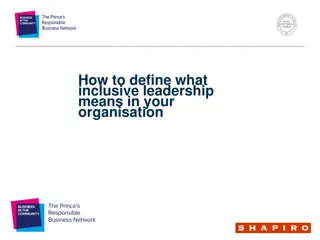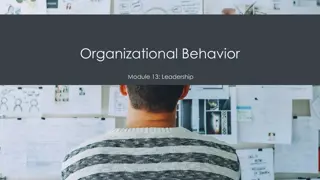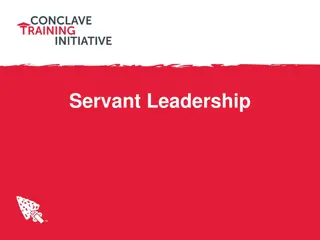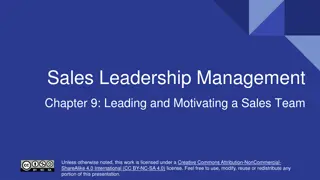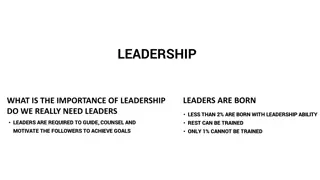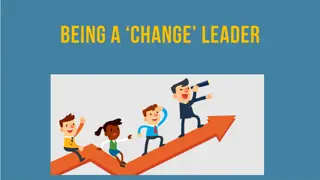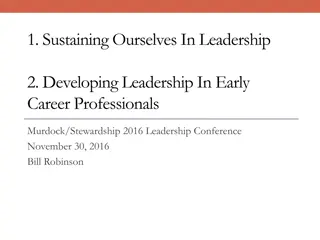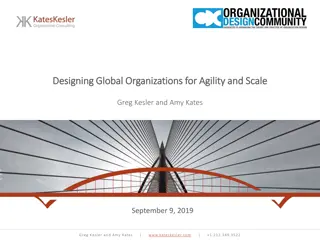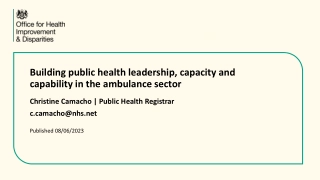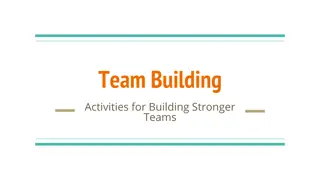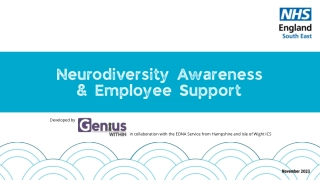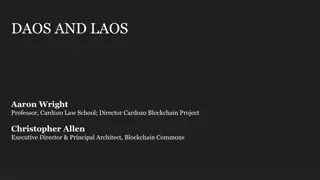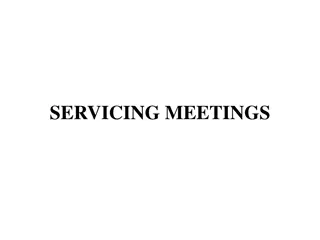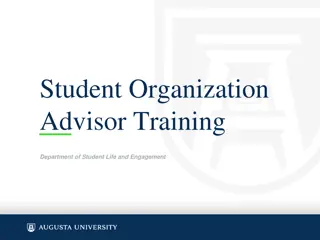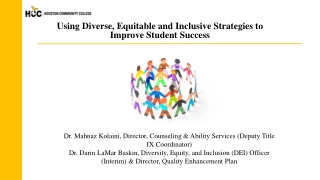Building the Business Case for Inclusive Leadership in Organizations
In today's evolving business landscape, organizations need to embrace inclusive leadership to drive innovation, enhance performance, and meet the diverse needs of employees and customers. The shift towards inclusivity is essential for fostering trust, boosting productivity, and ensuring sustainable growth in a global market characterized by diversity and rapid changes.
Download Presentation

Please find below an Image/Link to download the presentation.
The content on the website is provided AS IS for your information and personal use only. It may not be sold, licensed, or shared on other websites without obtaining consent from the author. Download presentation by click this link. If you encounter any issues during the download, it is possible that the publisher has removed the file from their server.
E N D
Presentation Transcript
How to build the business case for inclusive leadership in your organisation
The world has changed and business needs to change too The business landscape is characterised by the need for agility to respond to the opportunities for growth in emerging markets and the cultural changes inspired by social media and new ways of networking. Global Markets New ways of working Emerging markets Values, ethics and CSR Collaborative working More than ever before, organisations are collaborating to achieve growth and ensure efficiency. Increasingl y diverse customers Legal Productivity and performance doing more with less, is heightening the need for strong engagement and innovation. framework Diverse leadership & talent pipeline Changing communication technologies The diversity of customers and the workforce is growing. There is a crisis of trust within organisations, with pressures to meet the public s high expectations of values and ethics within business and achieve high targets. Austerity doing more with less Quality and innovation Productivity and performance
The leadership challenge Less than half of UK employees (48%) report positive innovation within their organisations, lagging behind our key competitors India, China & the Middle East (Kenexa) Exceptional service behaviour has been proven to increase profits by impacting the quality of the relationship with the client & customer. Exceptional service behaviour is spontaneous and authentic. Generating this behaviour has been repeatedly linked to employees feeling treated fairly by their manager and organisations (InsideOut) Diversity of customers is increasing 80% of the minority ethnic population is aged 16 35 with an annual disposable income of 32bn Women own 48% of the nation s personal wealth, expected to rise to 60% by 2026 LGB consumer power is worth an estimated 70 - 81bn Workforce diversity is increasing but diverse talent is not getting through to top positions only 7% of management posts are held by someone from a Black, Asian or minority ethnic background (BAME) women make up just 16.7% of FTSE 100 company Boards nearly one in five lesbian and gay people, almost 350,000 employees in Britain, have experienced bullying from their colleagues because of their sexual orientation (Stonewall) non-disabled people are over three times as likely to earn salaries of 80,000 or above than disabled people (RADAR)
The inclusive leaders response 83% were more loyal to their leader, team and organisation Inclusive leaders get the best out of all their people, helping their organisations to succeed in today's diverse, global environment. In our research into the impact of inclusive leaders on the performance and careers of employees from a range of diverse backgrounds, (including women, lesbian, gay and bisexual employees, disabled employees, employees from a Black, Asian or Minority Ethnic Background), they told us 84% felt more motivated 81% 81% were more motivated to go the extra mile improved their performanc e & productivity By building strong relationships and diverse teams, inclusive leaders are able to increase productivity, performance and engagement with staff and customers. Over 75% said they felt able to be more authentic at work Over 75% felt more confident at work Over 50% had benefited from career enhancing opportunities Over 80% said they felt more valued
Why is inclusive leadership important to your organisation? Unless the role of inclusion in meeting core business challenges is well set out and understood, it is highly unlikely that progress will be made in mainstreaming inclusion as a core leadership capability. If you can answer YES to any of the 8 questions below, then it is likely that there is a strong business case for developing more inclusive leadership capabilities in your organisation. 1. Is building relationships with different customers and clients important for our business? 2. Is building alliances with different stakeholders and being able to work collaboratively with different organisations important for our business? 3. Do we need to improve employee engagement? 4. Are we striving to increase innovation? 5. Do we need to improve productivity? 6. Do we sometimes find it hard to find the talent we need for our business? 7. Is customer service important for our business? 8. Is being able to work successfully across national cultures important to our business?
Two examples of identifying the business case for inclusive leadership expanding in to global markets How well does our workforce reflect the diverse customers we are seeking? expanding UK market to untapped diverse customers expanding in to emerging markets What understanding of diverse customer needs do we have? How engaged are we with diverse customers? Do we have the skills & understanding we need to thrive in global & emerging markets? Growth What are the cultural issues associated with growth in global & emerging markets? early identification of problems learning from mistakes quality improvement How involved are diverse staff in the quality improvement & innovation process? How valued do diverse staff feel? Innovation & Improvement productivity improvement employee engagement Is there 2-way flexibility the organisation in meeting the needs of employees from different groups and employees meeting the needs of the organisation? Is there diversity of background & thought amongst teams and decision makers? Is there a danger of group think?


